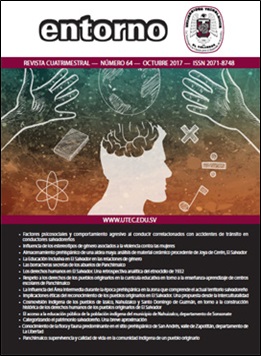Psychosocial factors and aggressive driving behavior in reciprocity to traffic accidents caused by salvadorean drivers
DOI:
https://doi.org/10.5377/entorno.v0i64.6056Keywords:
Aggressiveness (psychology), Behavior (psychology), Car accidents - Research - El Salvador, Traffic Safety - El SalvadorAbstract
The objective of this study is to analyze whether the psychosocial factors and the aggressive behavior of drivers in El Salvador are related to the car accidents they get involved in. This is an ex post facto study, with transversal and retrospective designs; an unintentional, non-probabilistic sampling was used. The sample included 1,012 private and public drivers; both men and women were involved in the study. A survey was conducted with the drivers. The overall median age was 34.81 years, with a TD (Typical Deviation) of 11.02. The median age of men was 34.84 with a TD of 11.15, and the median age of women 34.65 with a TD of 10.29. The sociodemographic variables included the following: 152 (15,0%) were women and 860 (85,0%) were men. According to the number of years of experience, they were divided as follows: 1-5 yrs. of experience, 341 (33,9%); 6-15 yrs. of experience, 379 (37,7%); more than 16 yrs. of experience, 285 (28,4%). The instruments used included the general work wellbeing questionnaire (QBLG), the Magallanes scale of stress (EMEST, given its Spanish Acronym), the Goldberg scale of anxiety and depression, the “Driver Anger Scale” and the Driving Log. The findings showed that there is a relevant reciprocity between the psychosocial factors and aggressive driving behavior in relation to traffic accidents.
Entorno, octubre 2017, número 64: 9-19
Downloads
2086
Downloads
Published
How to Cite
Issue
Section
License
© Entorno
It is required that the authors transfer the right of re-production of their articles to the Entorno Journal

